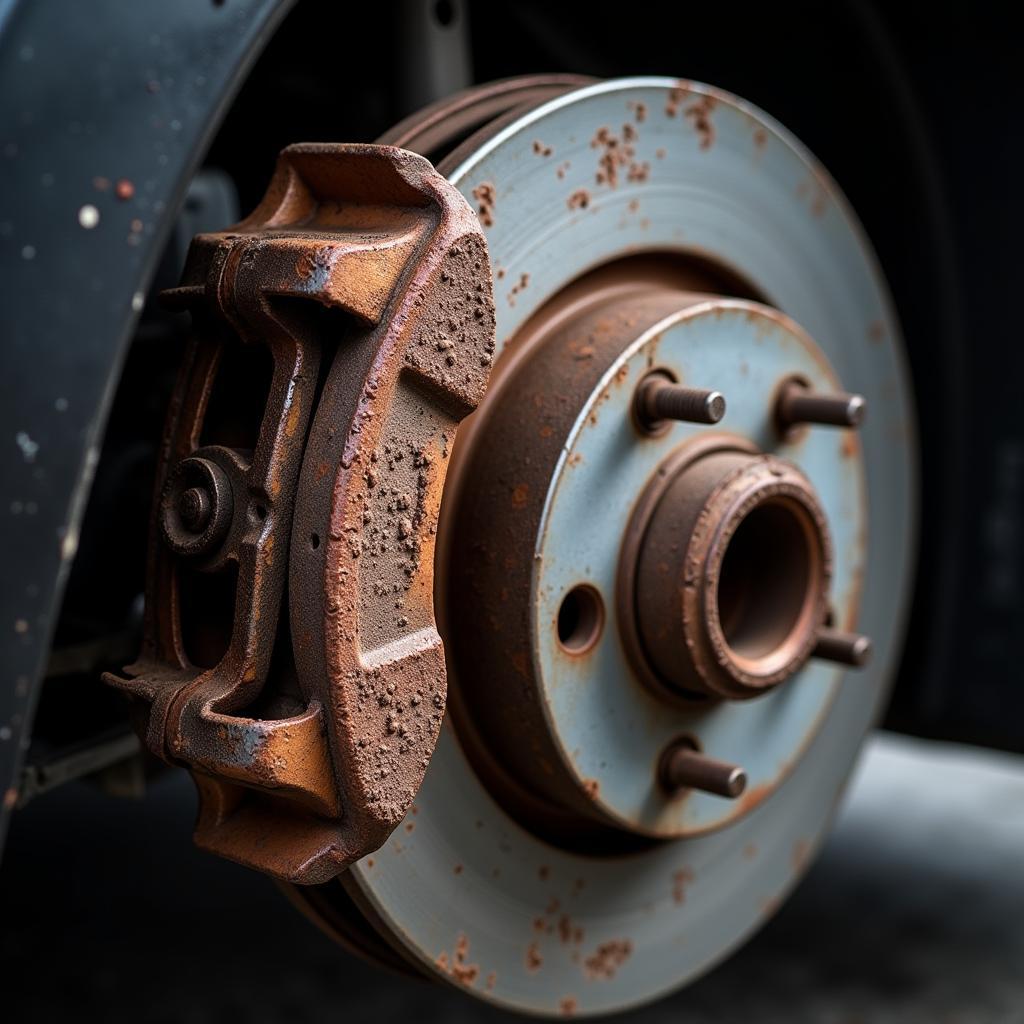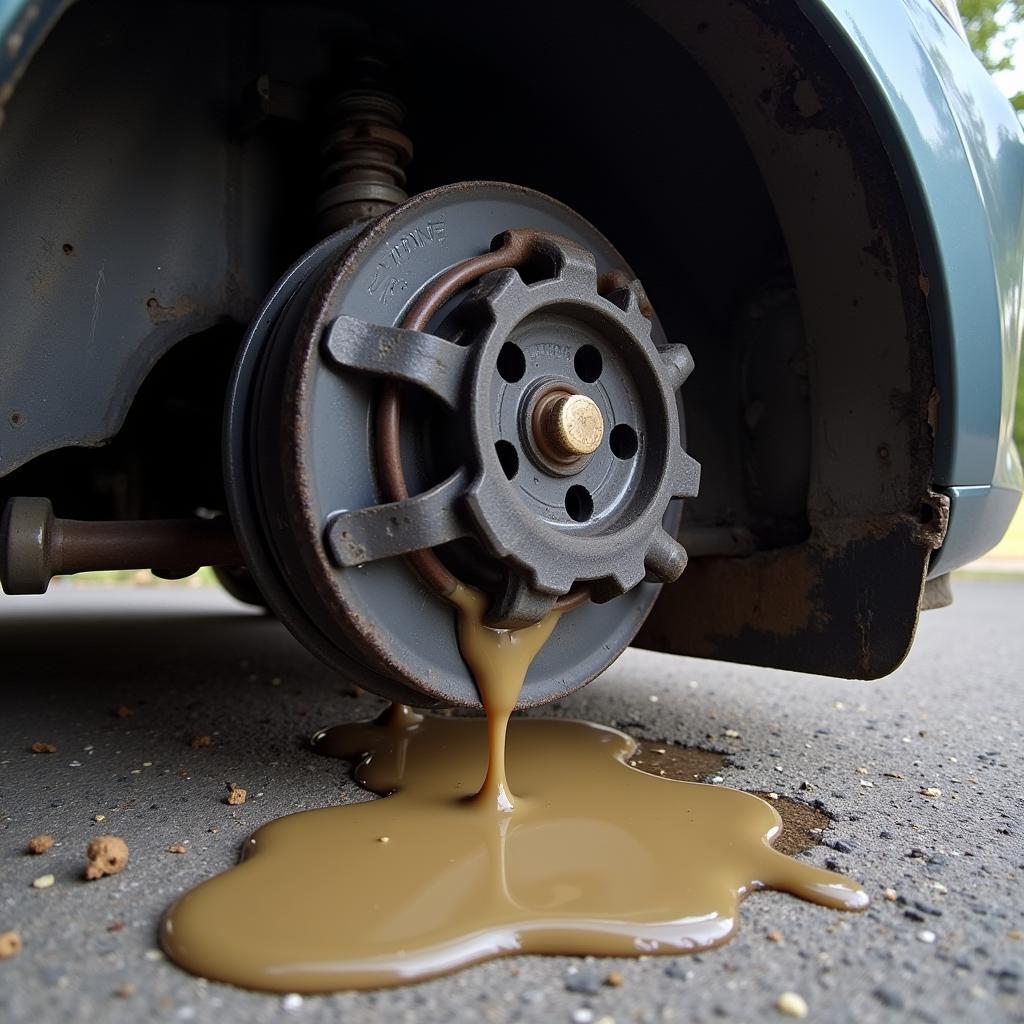Car brake problems can be a serious safety hazard, so understanding their root causes is crucial. From worn brake pads to more complex issues like brake fluid leaks, various factors can compromise your braking system. This comprehensive guide explores the common culprits behind brake problems, empowering car owners and mechanics to diagnose and address them effectively. Learn more about some common brake problems in cars.
Common Culprits Behind Brake Issues
Several components work together to ensure your car stops safely and efficiently. When one or more of these components malfunction, it can lead to various brake problems. Here are some of the most frequent causes:
Worn Brake Pads and Rotors
Brake pads and rotors are designed to wear down over time. However, excessively worn pads can cause grinding noises, reduced braking performance, and even damage to the rotors.
What causes premature wear of brake pads? Aggressive driving habits, frequent hard braking, and driving in hilly or mountainous terrain can accelerate brake pad wear.
Brake Fluid Leaks
Brake fluid is the lifeblood of your braking system. Leaks in the brake lines, calipers, or master cylinder can lead to a loss of hydraulic pressure, making it difficult or impossible to stop your car.
How can I identify a brake fluid leak? Look for puddles of fluid under your car, a low brake fluid level in the reservoir, and a spongy or soft brake pedal.
 Worn Brake Pads and Rotors Showing Significant Wear and Tear
Worn Brake Pads and Rotors Showing Significant Wear and Tear
Faulty Brake Calipers
Brake calipers house the pistons that apply pressure to the brake pads, squeezing them against the rotors to slow or stop the car. A seized or sticking caliper can cause uneven brake pad wear, pulling or dragging sensations, and reduced braking efficiency.
What are the symptoms of a bad brake caliper? A seized caliper often leads to a burning smell, overheating wheels, and reduced fuel efficiency. You might also experience brake car problems such as a car pulling to one side when braking.
Air in the Brake Lines
Air in the brake lines can compress, reducing the hydraulic pressure needed for effective braking. This can result in a soft or spongy brake pedal and decreased braking power.
How does air get into the brake lines? Air can enter the brake lines during brake fluid changes, repairs, or due to leaks.
Master Cylinder Problems
The master cylinder is the heart of the braking system, responsible for generating the hydraulic pressure that activates the brakes. A faulty master cylinder can lead to a loss of braking power, a soft brake pedal, and difficulty stopping the car.
 Brake Fluid Leak Under Car Indicating a Potential Brake System Problem
Brake Fluid Leak Under Car Indicating a Potential Brake System Problem
Problems with the ABS System
The Anti-lock Braking System (ABS) prevents wheel lockup during hard braking, allowing you to maintain steering control. Malfunctions in the ABS system, such as a faulty ABS sensor or control module, can trigger warning lights and compromise the system’s effectiveness.
Parking Brake Issues
A malfunctioning parking brake can make it difficult to park on inclines or prevent the car from rolling when parked. This can be caused by a stretched or broken parking brake cable, worn brake shoes, or problems with the parking brake mechanism itself. Dealing with various car problems that everyone has can be frustrating, and brake issues are certainly among them.
Vacuum System Problems
Some vehicles use a vacuum booster to assist in braking. Problems with the vacuum system, such as a leak in the vacuum hose or a faulty vacuum pump, can reduce braking assistance, making the brake pedal feel stiff and requiring more effort to stop.
Diagnosing and Addressing Brake Problems
Accurately diagnosing the cause of your brake problems is essential for effective repair. A thorough inspection by a qualified mechanic is often necessary to identify the underlying issue and recommend the appropriate course of action. Don’t hesitate to seek professional help if you experience any brake problems. Sometimes, car problems in the front can be related to brakes as well.
“Regular brake inspections are crucial for preventing serious problems. Don’t wait until you hear grinding or experience reduced braking power.” – John Smith, Automotive Engineer
Conclusion
Understanding What Causes Car Brake Problems is vital for maintaining your vehicle’s safety and performance. Regular maintenance and timely repairs are essential for preventing major brake issues and ensuring reliable stopping power. If you’re experiencing any car transmission problem no move, it could be related to your brakes, so don’t delay getting it checked out. For expert assistance and reliable brake repairs, connect with AutoTipPro at +1 (641) 206-8880 or visit our office at 500 N St Mary’s St, San Antonio, TX 78205, United States.
“Addressing brake problems promptly can save you money and ensure your safety on the road.” – Jane Doe, Certified Mechanic
FAQ
- How often should I have my brakes checked?
- What are the signs of worn brake pads?
- What should I do if my brake pedal feels spongy?
- How much does it cost to replace brake pads and rotors?
- Can I drive with a faulty ABS system?
- What causes a parking brake to malfunction?
- How can I prevent brake problems?





Leave a Reply